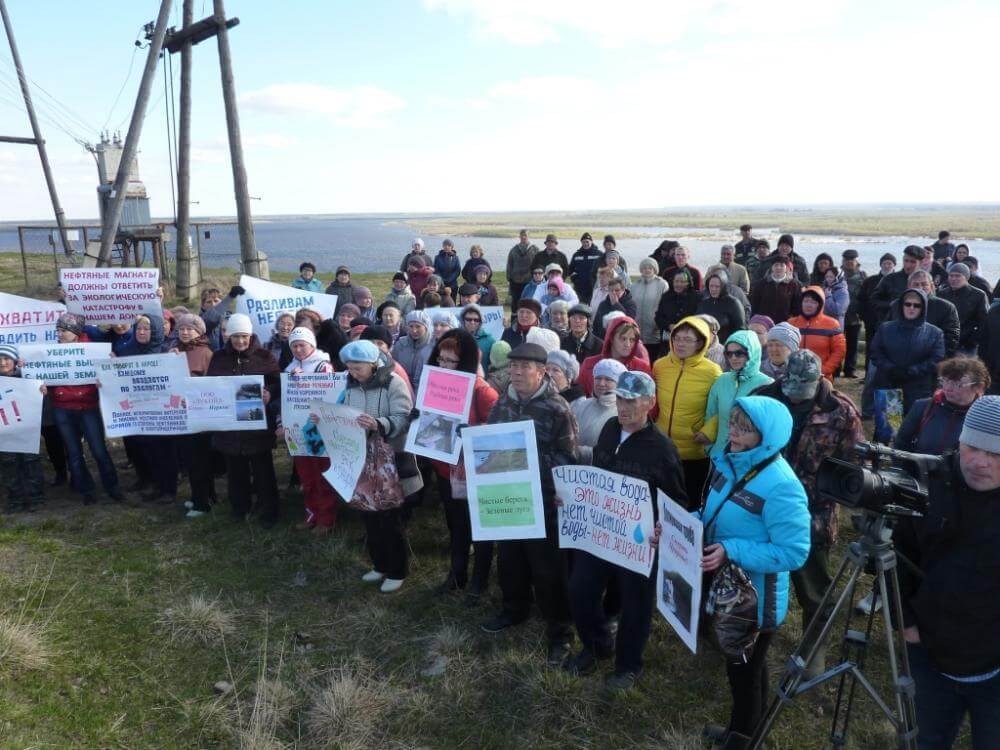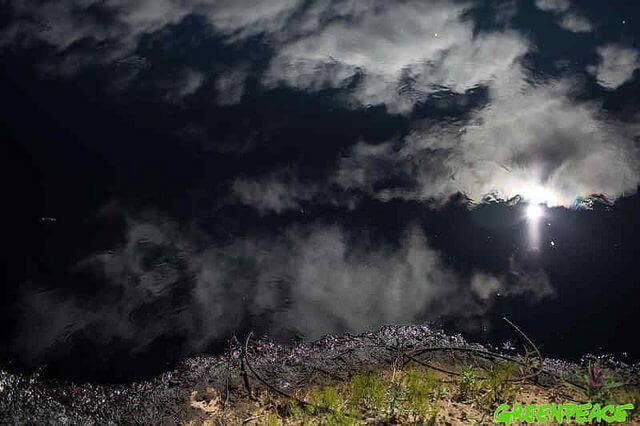This is a guest blog by Asti Roesle from Greenpeace.

I have just been in the Republic of Komi, Northern Russian, taking part in an oil spill patrol by Greenpeace Russia and the local NGO Save the Pechora Committee which is run by local volunteers.
Sadly, I am discovering many parallels between the situation caused by Shell in the Niger Delta and the one in the Pechora Basin in Komi caused by Lukoil.
What stands out is the outrageous manner in which communities affected by the impacts of utterly irresponsible oil extraction operations and decades of oil pollution are being treated. They are facing a solid wall of ignorance, power and intimidation.
Local people’s health here is heavily affected by air, water and food pollution. Tatiana, an active community member, tells me how in July again two people in her village died of cancer. Indeed, arriving in the oil production area I immediately felt a slight ache in my lungs and pressure on the chest. The oil industry here is flaring associated gas, which manifests in flames you can see from great distances while you’re driving along the road. Another villager flags the absurd situation that while having an unhealthy amount of gas in the air, the villages do not get any gas supplies for heating – they are only using firewood. He mentions the word genocide when speaking of what has been happening to the indigenous people in this area – starting with the wipe out of indigenous culture during Soviet Union times followed by the degradation of their livelihoods in the last 30 years, since the oil industry settled in this area. Only around 10 % of the people in the villages have jobs in the oil industry.
In only a few days, our oil spill patrol detected over 100 fresh and existing oil spills in the forests, swamps, grasslands and along the river banks. We found an astounding variety of oil spills: corroded and ruptured pipelines, leaking pipeline connections and regulation gear, illegal sludge leftovers and dumping are just some examples. The basin of the Pechora river is a natural pasture area which usually gets flooded in spring times when the snow melts. I can understand now what happened here in spring 2013 and is going to be repeated: the natural flooding distributes the toxic crude oil out into the environment, on top of the spills which lead directly into stream, rivers and ground water. This is directly poisoning people’s source of livelihood.

Whatever attempts local people make to stand up for their rights – by filing complaints, writing letters, talking to authorities, bringing up evidence of how the oil industry harms their livelihood – they are confronted with inaction and cover-up by both the industry and authorities. One example out of many: a local ranger tells me how he posted a photo of a fresh oil spill site on the local public website. Only five hours later it vanished from the site.
Like in Ogoniland in the Niger Delta, Pechora dwellers are protesting about their grievances – regardless of the Russian anti protest law. Recently in June 2014, villagers of Ust-Usa presented their demands in an impressive rally, demanding the oil industry clean up and get off their land. To many people the situation seems hopeless, but as elsewhere, the first step towards achieving change is when communities are outspoken about the injustice happening to them. One of the Save the Pechora Committee members told me how she met and shared stories with a representative of Niger Delta communities at an Indigenous Peoples conference in Usinsk in 2012.
Save the Pechora Committee are currently interviewing people in the affected villages and gathering socio-economic data on how people are impacted which will be published soon. Together with Greenpeace Russia they have launched recommendations to improve the relevant Russian legislation in a report called “Oil pollution in Russia: problems and possible solutions.” Those recommendations were discussed with oil companies and government agencies in the city of Usinsk last month.
You can help and sign a petition addressing oil companies to clean up their act in Russia.